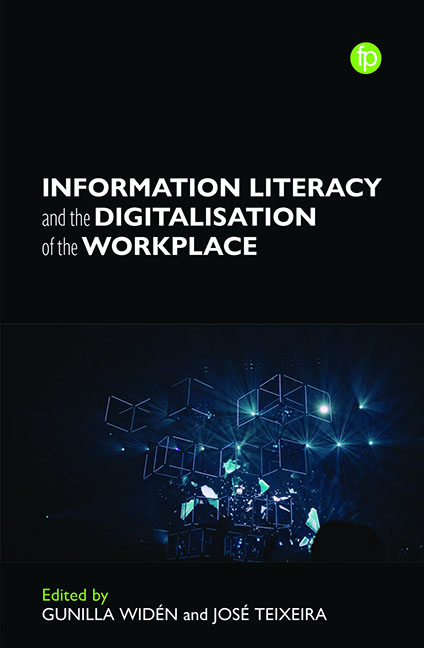Book contents
- Frontmatter
- Contents
- Figures and Tables
- Contributors
- Introduction: Advancing Theory on Workplace Information Literacy
- 1 Literature Review: In Search of the Many Meanings of Information Literacy
- 2 Digital Literacy in a Post-Digital Era: Rethinking ‘Literacy’ as Sociomaterial Practice
- 3 Methodological Choices of Information Literacy in the Workplace: Qualitative, Quantitative or Mixed-Methods?
- 4 Investigating Information Seeking and Information Sharing Using Digital Trace Data
- 5 Making Do With Limited Transparency of Sensitive Information in Secretive Organisations: Collective Information Literacy Through Hinting
- 6 Information Literacy Competencies for Career Transitions in the Digital Age
- 7 The Importance of Information Literacy for Work Satisfaction in a World-Wide-Workplace Context
- 8 Entrepreneurs’ Digital Information Sources Selection: A Perspective on the Impact of Information Literacy and Generational Differences
- 9 Conclusion: Workplace Information Literacy as the Literacy of the Digital Workplace
- Index
Introduction: Advancing Theory on Workplace Information Literacy
Published online by Cambridge University Press: 17 December 2023
- Frontmatter
- Contents
- Figures and Tables
- Contributors
- Introduction: Advancing Theory on Workplace Information Literacy
- 1 Literature Review: In Search of the Many Meanings of Information Literacy
- 2 Digital Literacy in a Post-Digital Era: Rethinking ‘Literacy’ as Sociomaterial Practice
- 3 Methodological Choices of Information Literacy in the Workplace: Qualitative, Quantitative or Mixed-Methods?
- 4 Investigating Information Seeking and Information Sharing Using Digital Trace Data
- 5 Making Do With Limited Transparency of Sensitive Information in Secretive Organisations: Collective Information Literacy Through Hinting
- 6 Information Literacy Competencies for Career Transitions in the Digital Age
- 7 The Importance of Information Literacy for Work Satisfaction in a World-Wide-Workplace Context
- 8 Entrepreneurs’ Digital Information Sources Selection: A Perspective on the Impact of Information Literacy and Generational Differences
- 9 Conclusion: Workplace Information Literacy as the Literacy of the Digital Workplace
- Index
Summary
In today's world, information plays an increasingly essential role in the smooth functioning of our society (Dufva and Wäyrynen, 2020). The last few decades have seen a considerable surge in the production and consumption of information at all levels and spheres of society across family, media, education, religion and the workplace. Even pre-industrial eras of humanity were dependent on information for societal advancement. Nevertheless, the phenomenal growth in the volume, velocity and variety of information alongside technological developments has resulted in the novel ways in which information contributes to social and economic development. At no point in history did human welfare and progress so much depend on efficient management of information as today (Floridi, 2009; Ziemba, 2019). Whether we can claim to have developed a perfect information society is subject to debate. But, without doubt, the world has experienced extensive ‘informatisation’ resulting in the information industry becoming a major part of modern economies while simultaneously changing the ways in which people interact with information in their day-to-day lives. All while technology is becoming embedded in everything and attention on equity aspects of digitalisation becomes increasingly important (Dufva, 2020).
The evolution of modern information societies has been possible largely because of technological developments and we have been living the digital transformation for quite a while now (Hilbert, 2022). Information and communication technology (ICT) has enabled us to connect in unprecedented ways. The information landscape of the world would not have been this dynamic if it was not for the affordances of information technology. Digital tools and technologies are increasingly part of our everyday life as well as our working life, affecting how we communicate, interact and perform different activities. Technology also comes with important challenges, such as risks with use of data, who decides how to develop technology and for what purposes (Dufva and Wäyrynen, 2020). Some technologies have been around for so long that they are already well integrated into our ways of acting. Still, we are in the midst of rapid technological development and new digital innovations are constantly knocking on the door, asking for an agile introduction to our everyday lives, to workplaces and to society at large.
- Type
- Chapter
- Information
- Information Literacy and the Digitalisation of the Workplace , pp. xv - xxviiiPublisher: FacetPrint publication year: 2023



